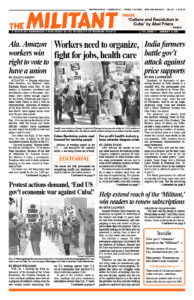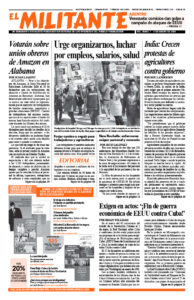ATLANTA — Despite objections from Amazon, the National Labor Relations Board ruled Dec. 16 that workers at Amazon’s warehouse and distribution center in Bessemer, Alabama, have shown enough support for the Retail, Wholesale and Department Store Union to hold a vote on representation. Hundreds of workers at the huge facility, which opened in late March, have signed union cards over the past two months.
The board held a hearing beginning Dec. 18 to decide on the details of the election, after the bosses and union officials couldn’t reach agreement on who would be eligible to vote and when it will be held.
The stakes are high. If the union wins the vote, it would be the first unionized Amazon facility in the U.S.
“This will be good,” Sharon Franklin told the Militant Dec. 19 by phone from Bessemer. Because of her fear of retaliation by Amazon bosses, the Militant is using a pseudonym. Franklin, who used to work in housekeeping in the area, started at Amazon in June.
The union says the bargaining unit and vote should be for the 1,500 permanent full- and part-time warehouse and distribution center workers. Amazon wants the vote to include office staff, engineers, software workers and other employees not on the shop floor — which it claims would bring those eligible to vote to more than 5,700. The company hopes this would kill the organizing effort.
“People get sick in there every day,” Franklin said. “But if you go to the Wellness Office and say you’re sick and need to leave, the manager says, ‘I need you here.’ You’re not given the time and equipment to clean your own area.”
“Every day they come up with new rules,” she said. “The work is too much, 10 and 12 hours a day. We get written up for all kinds of things. Everything is ‘TOT’ — ‘time off task.’ If you take more than five minutes to use the bathroom, they start docking your time.”
According to the Washington Post, Amazon said in October that nearly 20,000 of its U.S. employees had tested positive or showed symptoms of COVID since the pandemic began.
Union organizers are continuing to get workers to sign authorization cards. Bessemer is near Alabama’s unionized coalfields and is part of the greater Birmingham industrial area, long a center of steel production, with strong union traditions.
After the NLRB decision “the company sent us two long texts right away about why we shouldn’t sign union cards,” Franklin said, trying to intimidate workers. “They said if we signed a union card, we’d be giving up the right to speak for ourselves and that if we feel like we were misled by the union, we should ask for our card back.”
While thousands of small proprietors and other retail bosses are being driven out of business in the wake of government-ordered lockdowns and other pandemic-justified restrictions, Amazon’s online sales are booming.
The second-largest U.S. employer after Walmart, Amazon has some 1.1 million workers worldwide and 760 fulfillment centers in the U.S. and touts its hourly jobs as great. Since July it has averaged hiring 2,800 workers every day.
Amazon’s real impact, however, has been to drive down the average wages of warehouse and delivery workers in areas it moves into.
“Six years ago, before the company opened a giant fulfillment center in Robbinsville, New Jersey, warehouse workers made $24 an hour on average, according to BLS [Bureau of Labor Statistics] data. Last year the average hourly wage slipped to $17.50,” reported a Dec. 17 article on the Bloomberg News website titled, “Amazon Has Turned a Middle-Class Warehouse Career Into a McJob.” Amazon is also pushing down wages of truck and other delivery drivers.
Amazon hasn’t responded to the Militant’s request for comment.

